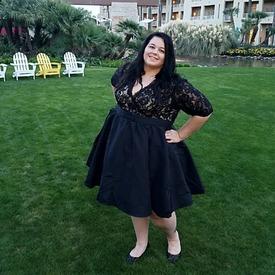fat question

Silvercivic
Posts: 156 Member
I tried asking this question last week but nobody responded... So I'm gonna try it again! 
I've been doing pretty well staying just under my calories and eating a good variety of balanced foods. For whatever reason, I tend to gravitate towards foods that are lower in fat. Not because I think fat is bad- I just don't love butter or mayo on things and I don't care for creamy, heavy sauces or dishes. I get most of my fat from avocado, meat and nuts. I am usually way under the goal number in the fat category. Is this going to hurt my weightloss goals? Should I try replacing some of my lower fat foods with higer fat ones? Or is it ok if I keep doing what I'm doing? What are some foods other than avocado, nuts and meats that I could eat?
I've been doing pretty well staying just under my calories and eating a good variety of balanced foods. For whatever reason, I tend to gravitate towards foods that are lower in fat. Not because I think fat is bad- I just don't love butter or mayo on things and I don't care for creamy, heavy sauces or dishes. I get most of my fat from avocado, meat and nuts. I am usually way under the goal number in the fat category. Is this going to hurt my weightloss goals? Should I try replacing some of my lower fat foods with higer fat ones? Or is it ok if I keep doing what I'm doing? What are some foods other than avocado, nuts and meats that I could eat?
0
Replies
-
Since I can't see your diary I have no idea how much fat you eat daily or what your goal grams for the day are. I find it hard to imagine if you are eating any significant amount of meat, nuts, or avocado that your fat number would be too low, but then you could surprise me.0
-
I think you are doing great. Natural non-processed fats are going to be healthiest for you. Lower fat intake means lower fat added on ya hiney!
 0
0 -
I think you are doing great. If you feel like you need more healthy fat in your diet sautee your veggies in olive oil or cook your chicken in olive oil.0
-
I do not think the lower fat is going to hinder your goals. Honestly some people do better on a "low fat" meal plan. I personally seem to do better with higher fat, I dunno, I'm less grouchy. LOL0
-
I think you are doing great. If you feel like you need more healthy fat in your diet sautee your veggies in olive oil or cook your chicken in olive oil.0
-
Can always pick full fat or higher vat versions of the stuff you are eating if you're worried about it, 2% or whole milk instead of skim etc.0
-
I'm the same, avocados, nuts, I love cheese but have cut down on that quite a bit...I add a tsp flax oil or udo oil to my protein shakes in the morning and add a boiled egg during the day with a mini babybel light:) Salmon fillet once or twice a week...If I do a stirfry I will use coconut oil, some people don't like it because it is higher fat but it does have a lot of other health benefits. Plus, you are only using a small amount and it adds flavor:) Hope this helps:)0
-
I add a table spoon of fish oil to my protein smoothie that adds some healthy fat to my diet. My wife adds flax seed oil because she's a vegetarian. Both are healthy fats and good for your heart. They can be added to other things or just taken alone too.0
-
As far as I know, to maintain weight your fat intake should be 30% of your total calories. Therefore, to lose weight you want to be under 30%. That's one thing I don't like about the way this computes your intake, it will still tell you you're under your fat goal when you really are not because it is computing on your goal, not what you ate. If your calories are under, your fat should also be lower. To figure your fat intake, multiply your fat intake by 9 and divide that by the actual calorie intake. This will give you the % of fat; which if you are trying to lose weight you want to be under 30%. I try to have my fat calories between 15% and 20%. If your calorie intake is 1200 and your fat was 20, 20x9=180 divided by 1200 =15%0
-
monounsaturated fat is GOOD FOR YOUR BODY! It helps lower bad cholesterol and is good for your heart.... like the avocados you're already eating, olive oil (as mentioned above), any nuts, olives, flax seed or oil, peanut butter.... even dark chocolate. I don't know how true this is, but studies claim that eating a diet high in monounsaturated fat actually helps your body get rid of fat........ similar to a mediterranean diet....0
-
As far as I know, to maintain weight your fat intake should be 30% of your total calories. Therefore, to lose weight you want to be under 30%. That's one thing I don't like about the way this computes your intake, it will still tell you you're under your fat goal when you really are not because it is computing on your goal, not what you ate. If your calories are under, your fat should also be lower. To figure your fat intake, multiply your fat intake by 9 and divide that by the actual calorie intake. This will give you the % of fat; which if you are trying to lose weight you want to be under 30%. I try to have my fat calories between 15% and 20%. If your calorie intake is 1200 and your fat was 20, 20x9=180 divided by 1200 =15%
This isn't true.
My macros are set at 40% carbs/30% protein/30% fat.
I get all of my fat from vegetable sources (avocados, nuts, olive oil, etc)
Fat is needed by the body for proper brain function and hormone production. It will also help your skin and hair, and really helps to make you feel satisfied longer between meals.
Low-fat diets may work for some people to promote more whole food intake, but as a whole they are seen as a trend in the diet world that is passe - and the dearth of low-fat products are nowhere near what nature made.0 -
Guess I'm old school then !!!! 30% is a healthy amount but for me being under 30% fat calories helps my weight loss progress. When I reach my goal, 30% is the way to go0
-
I think a lot depends on how your goals are set. If you change your protein it automatically changes your fat ! and vice- versa. When trying to lose weight you need to lower your fat intake; they have it set as tho to "maintain" your current weight. If you are using their guidelines, they have your fat intake too high, so its good you are under. There are a few things that are off on their goals. 2500 for sodium -- seriously ??? I lowered it to 1500 which I've researched, 2500 is way too high !!!. I also had to adjust my cholesterol. I have high bp and high chol. if I follow their guidelines, my health would be at risk.0
-
I think a lot depends on how your goals are set. If you change your protein it automatically changes your fat ! and vice- versa. When trying to lose weight you need to lower your fat intake; they have it set as tho to "maintain" your current weight. If you are using their guidelines, they have your fat intake too high, so its good you are under. There are a few things that are off on their goals. 2500 for sodium -- seriously ??? I lowered it to 1500 which I've researched, 2500 is way too high !!!. I also had to adjust my cholesterol. I have high bp and high chol. if I follow their guidelines, my health would be at risk.
No you don't need to reduce your fat intake to lose weight.
To lose weight you need to eat at a calorie deficit.0 -
As far as I know, to maintain weight your fat intake should be 30% of your total calories. Therefore, to lose weight you want to be under 30%. That's one thing I don't like about the way this computes your intake, it will still tell you you're under your fat goal when you really are not because it is computing on your goal, not what you ate. If your calories are under, your fat should also be lower. To figure your fat intake, multiply your fat intake by 9 and divide that by the actual calorie intake. This will give you the % of fat; which if you are trying to lose weight you want to be under 30%. I try to have my fat calories between 15% and 20%. If your calorie intake is 1200 and your fat was 20, 20x9=180 divided by 1200 =15%
Absolutely not true. my macros are set to 40c/30p/30f and I've lost 25 Lbs in 4.5 months. Your macro ratios have little to do with weight loss..weight loss is calories in, calories out.
Also, if you have high cholesterol you should be watching your saturated fats (and definitely no trans fats...though nobody should be eating those), but getting more heart healthy fats and omega 3 fatty acids. I've taken my blood work from being virtually off the charts to almost normal in about 6 months with a diet that is 30% fat.0 -
Warning: I'm about to get gross with this answer.
Fat is important for pooping, and it's probably wise to make sure you're getting enough to avoid potential problems later. Just like you want to get enough fiber to help things along, you also need to get enough fat. It helps with constipation via lubrication.
As others have said, I find it hard to believe you're eating avocados, nuts, etc and struggling. But if you are under you definitely want to re-think your eating habits and find a way to incorporate fat. Your hiney will thank you.0 -
Guess I'm old school then !!!! 30% is a healthy amount but for me being under 30% fat calories helps my weight loss progress. When I reach my goal, 30% is the way to go
If calories are held constant, reducing your fat intake will have no impact on weight loss. It can negatively affect hormonal balance though.0
This discussion has been closed.
Categories
- All Categories
- 1.4M Health, Wellness and Goals
- 398.2K Introduce Yourself
- 44.7K Getting Started
- 261K Health and Weight Loss
- 176.4K Food and Nutrition
- 47.7K Recipes
- 233K Fitness and Exercise
- 463 Sleep, Mindfulness and Overall Wellness
- 6.5K Goal: Maintaining Weight
- 8.7K Goal: Gaining Weight and Body Building
- 153.5K Motivation and Support
- 8.4K Challenges
- 1.4K Debate Club
- 96.5K Chit-Chat
- 2.6K Fun and Games
- 4.8K MyFitnessPal Information
- 13 News and Announcements
- 21 MyFitnessPal Academy
- 1.6K Feature Suggestions and Ideas
- 3.2K MyFitnessPal Tech Support Questions












